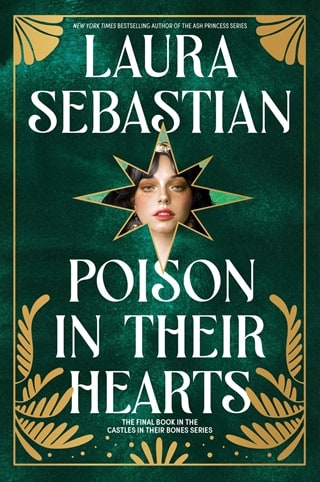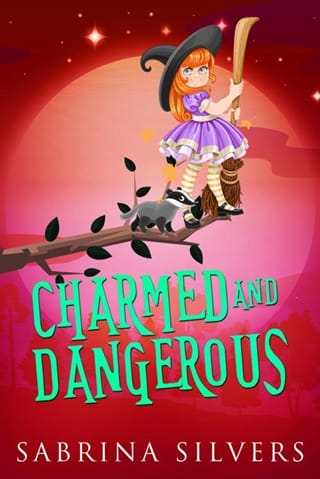Violie
When the group of youths leaves the public house, Violie leaves too, following them down the dirt path that leads away from the establishment and past a row of single-story stone houses with thatched roofs and smoking chimneys. At the end of the lane, they keep walking, passing through a gate and into a field. Violie can't follow without being seen, so she hangs back and watches as the trio enters a small, dark barn on the far side of the field. Moments later, the soft glow of a candle appears in the window on the second story.
She can't say for certain that only the three of them are in the barn, but she would wager good money on it, so she quickly hurries across the field herself. She finds the door and hesitates—should she knock? Or would that only put them on edge? Is barging in better or worse?
Before she can decide, she hears soft footsteps behind her and doesn't have time to turn before a rough burlap sack covers her head, a rope pulling tight around her neck to secure it. Violie knows better than to scream, but she does fight, throwing her weight back and trying to dislodge her attacker, hands fumbling for the dagger in her boot, but whoever put the bag on her head is quick to bind her arms as well.
"Who are you? Why are you following us?" a voice snaps in her ear—male, she guesses, and young. One of the group she followed, she realizes, relaxing slightly. He asks the question in Bessemian, assuming Violie is one of them. Which she is, she supposes, but that doesn't make her his enemy.
"I mean you no harm," she replies in Temarinian, keeping her voice calm.
"That," another voice says—this one coming from in front of her with a higher cadence; the girl, she thinks—"isn't an answer to either question."
Violie takes a breath. "The answer to the first question is long and I'd rather give it in more comfortable circumstances," she says. "But to answer your second—I've come to keep you from foolishly running headlong into the trap those soldiers clearly laid out for you at the public house."
Silence follows her words.
"Get her inside," the girl says finally, her voice hard. "Quick, before she's seen."
Hands grab Violie's arms, hauling her forward. Though the bag over her head keeps her from seeing, she feels the moment she steps into the barn, the soft grass beneath her boots giving way to packed dirt. A door closes behind her just as the hood is roughly pulled from her head. Violie blinks, her eyes slowly adjusting to the warm glow of a lantern, held by the boy she first noticed in the tavern, with the white-knuckled hands and the bare fear in his face. His hair is dark where the other boy's is fair, but there's a striking similarity to the shape of their faces and the blue of their eyes.
Now his fear is gone, replaced with cool anger.
"Did they send you?" he asked.
The Bessemian soldiers, he means. Violie shakes her head.
"I'm not with them," she says in Temarinian.
A hard smile slashes across his face. "You can drop the act," he tells her. "You speak Temarinian well, but there's no hiding the accent."
Violie blinks in surprise. She's always taken great pride in her language skills, and no one has ever critiqued her accent before. But then, the Temarinian accent she learned was polished and noble, designed to blend in with others at the palace and in Kavelle, should she have need to use it. Perhaps it's harder to hide her natural undercurrent of Bessemian here, where the way of speaking highlights her flaws.
She lets out a low breath. "I told you that who I was is a long story," she says, giving her wrists an experimental tug, but they're securely bound with a length of coarse rope. "Yes, it's true, I was born in Bessemia, but I am not aligned with the soldiers who have your friends." She glances between them, meeting each of their gazes in turn before continuing. "I'm with King Leopold."
She lets the words sink in, stunning them at first, though the shock quickly gives way to disbelief.
"King Leopold's dead," the girl says, scoffing. "Only fools believe otherwise."
"He isn't," Violie corrects. "Though not for lack of trying on many people's part—none more so than Empress Margaraux. Which is why I'm here and he's not. If they find him, he'll be sitting right beside your friends in whatever prison they've set up, though I doubt they'd wait for whoever the baron is to kill him."
The three of them exchange a look, and for a long moment, no one speaks.
"If King Leopold isn't dead, he's a traitor," the blond boy says. "If the soldiers want to kill him, they can go ahead. We won't mourn him."
Violie expected this, but there is still a small part of her that wants to defend Leopold. They have only heard stories of who he was, and she can't fault them for any low opinion based on that. And there is no way to change that opinion with her words, she knows.
"No," she agrees. "I don't suppose you would. You owe him no more loyalty than you owe the empress, do you?"
The girl looks like she wants to protest that but quickly closes her mouth.
Violie continues. "But he owes you—he owes all of Temarin a debt he is eager to repay. And he's going to begin by freeing your friends from the Bessemian soldiers."
Another stretch of wary silence follows that, but this time the look the three of them exchange is charged with something different—hope.
"Not friends," the dark-haired boy says quietly. "My sister—our sister," he adds, nodding toward the fair-haired boy. Brothers, Violie realizes, which explains the resemblance.
"And mine as well," the girl adds. "Daisy and Hester. Our parents told them to be careful, that tweaking the soldiers' noses wasn't worth what would happen if they were caught, but of course they didn't listen. They never do."
Violie remembers what the soldiers said, how it sounded like the thieves they caught had been giving them trouble for some time.
"I'm guessing it wasn't their first time robbing the armory," she says slowly.
"No," the dark-haired boy says. "The fifth time this month."
Violie is impressed—especially since after the first time, the soldiers would have been on high alert. Still, continuing to rob them was foolish, and it was only a matter of time before the thieves' skills were hindered by rotten luck. Foolish, she thinks, but incredibly brave. Not unlike Leopold himself.
"And do you know where they were hiding the spoils of their theft?" she asks.
Again, the three of them look to one another, having a conversation without words.
"How do we know you're telling the truth?" the girl asks. "You could be a spy, sent by them to get us to lead you to the weapons our sisters stole—that makes an awful lot more sense than a dead king returning."
Violie knows she's right, but she has no real proof on her. Even if she were to bring them to Leopold, how would they know he's who he claims to be? She doubts they ever saw him in person, certainly never got close enough to know his face.
"I told you the story of who I am is a long one," she says. "And if you don't mind, I'd appreciate having the use of my hands and a comfortable place to sit while I tell it."
Another beat of hesitation before the dark-haired boy takes hold of one of Violie's arms and she feels the cold metal of a knife at her wrists an instant before the ropes binding her are cut.
Violie holds nothing back in the story of her last few years, beginning with the moment she broke into Nigellus's palace laboratory to steal stardust when she was fourteen, desperate after her mother had fallen ill with Vexis, which was sure to kill her. Sitting cross-legged on a bale of hay while the three youths—who introduce themselves as Helena, the girl; Louis, the fair-haired boy; and Sam, his dark-haired brother—watch her with wary eyes. Those eyes grow warier when she tells them the truth of her initial involvement with the empress, and Violie wonders if perhaps being that honest was a mistake, but no—Leopold is owning his mistakes; the least she can do is own hers as well.
She tells them about coming to Temarin and ingratiating herself in the palace ahead of Sophronia's arrival, and then she tells them about Sophronia herself: the fearful princess anxious to do as her mother raised her to, until she saw the effect that would have on the Temarinian people. She tells them about Sophronia's soft heart and sharp mind and how, terrified of the empress as she was, she defied her in order to protect Temarin. She tells them how, in one of Sophronia's final acts, she saved King Leopold, and in doing so forced him to become a better man and a better king.
"I don't see why we should care," Helena says in the silence that follows Violie's recounting of Sophronia's execution and the way Leopold's screaming her name was drowned out by the cheers and jeers of the crowd. "The royalty and nobility never cared for us."
"No," Violie agrees, thinking about how she saw the Temarinian palace when she'd first arrived, the courtiers dripping in jewels and silks and sipping never-ending glasses of champagne while those who lived in the city just outside the palace walls starved to death. Perhaps Sophronia would disagree with her if she were here—Violie is sure she would—but Violie has no tears to spare for most of the nobility killed when the rebels laid siege to the palace. If the rebellion had been orchestrated by Temarinians demanding change from those who kept them pinned beneath the heels of their boots, Violie might even have applauded them for fighting back, but instead the rebels were directed by Empress Margaraux, their motive chaos, disguised as comeuppance. "I won't tell you that Temarin was a paradise before the siege—I saw enough of it to know that wasn't the case. But this? Now?" she asks. "Is this any better?"
She knows the answer to that and doesn't wait for them to provide it.
"Of course not. Of course it's worse, or your sisters wouldn't be imprisoned, awaiting judgment by whoever the baron might be." The three of them exchange a heavy look at the mention of his name, and Violie files that away in her mind with growing dread. "But I'm not asking you to choose between two untenable situations. I'm asking you to help King Leopold create a better Temarin, one that serves everyone, not only those elite few born into the right families. He isn't only here to tear out the weeds of the Bessemian invasion—he's here to plant seeds too. And he needs your help to do it."
Silence follows her words until Louis breaks it, clearing his throat. "What happened next to King Leopold?" he asks. "After Queen Sophronia was executed?"
Violie manages a small smile. "Will you let him tell you himself?"
The village entrances are guarded by Bessemian soldiers, and while Violie, as a visitor, might be able to get past them without suspicion, Helena, Louis, and Sam won't. If Violie is right about the guards laying a trap by taunting them about their sisters' imprisonment, leaving the village at this time of night in the company of a stranger will only paint a larger target on their backs, and should someone decide to follow their trail, it would lead them directly to Leopold.
Unlike the Bessemian soldiers, though, Helena, Louis, and Sam have lived in the village their whole lives and know every last cracked window and loose stone. In particular, they know that one such loose stone can be found in the north side of the wall that surrounds the village, at the bottom, obscured by an overgrown blueberry bush in Mrs. Hastel's garden. When the stone is removed, it reveals a tunnel that stretches beneath the wall, offering an escape for anyone small and fearless enough to fit through it.
Violie herself barely manages, dragging her body through the soft earth on her elbows, clods of dirt flaking down into her face, making it unwise to open her mouth to pant at the exertion. By the time she glimpses the opening ahead, all of her muscles burn, and despite the winter chill in the air, a thin layer of sweat covers her skin. When her head breaks through to the surface, she finally lets herself breathe deeply, wiping the back of her dirty hand over her dirtier face and blinking around at her new surroundings.
A small copse of woods, she notices, and a familiar one at that.
"Took you long enough," Helena whispers, not bothering to hide her grin.
Violie allows the girl her smugness—in a few years' time, Helena will either grow into her lanky limbs and find her own difficulty fitting through that tunnel, or she'll be dead. Either way, she can take her joy where she can find it.
Louis and Sam climbed into the tunnel before Violie as well, and now they stand nearby, speaking in low voices that Violie can't quite make out. She glances around the copse of trees, searching for a sign of Leopold or their horses. Surely, she would hear the horses if nothing else, she thinks with growing dread.
"Are we alone here?" she asks, her voice coming out sharp as she looks at the trio.
Sam shrugs. "There was an old beggar, but when Louis and I told him we had no coin or food to spare, he left."
"A bit odd to see a beggar with two horses, though," Louis adds. "I wonder why he didn't just sell one of them—that would get him money quicker than waiting in the woods for people to pass by."
Violie closes her eyes and forces herself to take a deep breath. "How long ago was this?" she asks slowly.
"Ten minutes?" Louis guesses. "Right before Helena showed up. You took a really long time."
Violie ignores that. "Which way did he go?"
Sam and Louis both point east, and without saying another word, Violie starts off in that direction. After a few seconds, the other three fall into step around her.
"What's wrong?" Helena asks. "Why are we chasing a beggar instead of meeting King Leopold?"
Violie doesn't answer, allowing the words to hang in the air until, seemingly at once, they realize.
"The beggar was King Leopold," Louis says, reaching out his hand to give his brother a light smack to the back of his head.
"Ow!" Sam replies. "How was I supposed to know? He didn't look like a king. He was hunched over and old."
"You saw his face?" Violie asks, knowing the answer before he gives it.
"Well, no," Sam says. "He kept his hood up. But I heard his voice and he sounded old."
"He was pretending, you fools," Helena says, shaking her head. "Just like in a folk song—the king pretending to be a poor peasant, rewarding the people who help him and punishing those who don't. You failed that test."
As the three of them dissolve into bickering, Violie wonders if she made a mistake. The two drunken men at the tavern might have come with their own challenges, but surely nothing so bad as this.
"Shh," she hisses, and the three of them fall quiet immediately. That, she thinks with some satisfaction, is likely not an effect she would have had over the drunks. "Unless you intend to run him off to another village for help, stay quiet."
It's a bluff—Violie knows Leopold would never leave without her—but it's a bluff that works. Silence falls over them as they hurry through the trees and into a wide-open meadow. As Violie's eyes scan the space, her heart sinks. There's no sign of Leopold or the horses.
"Maybe the soldiers caught him," Sam says quietly.
Before Violie can snap at him to be quiet, Helena jabs him sharply in the ribs, punctuating the move with a warning glare. Sam gives a brief yelp before falling silent, shooting Violie a sheepish look.
Violie tries to ignore Sam's words even though a large part of her knows how likely it is that he's right. No, she tells herself. Leopold is an excellent tracker and hunter and as such, he also knows how to hide his own tracks. She looks around, taking note of the walled village, the open meadow, the copse of trees behind them. If she were in his shoes, what would she do?
She turns sharply, the others stumbling to keep up with her as she quickens her pace. Instead of walking back into the copse of trees, though, she goes around it to the east, scanning the horizon until she catches sight of a blur of white in the darkness—her horse, there, behind a boulder beside a stream. She breaks into a run, heart beating quickly, but it isn't until she sees Leopold crane his head over the top of the boulder at the sound of her footsteps that she realizes how tightly fear had wound through her at the thought of losing him. But when she sees his face, the fear snaps and the next thing Violie knows, he's caught her in his arms and her own are wrapped around his neck.
"I told you not to move," she says, even though she understands why he did, would have done exactly the same in his position.
"And I told you to be careful," he replies. "So why do you look like you clawed yourself out of your own grave?"
Violie pulls back, looking down at her dirt-caked dress and skin. She can't see her face and hair, but she's sure they are in a similar state.
"Never mind that," she says, shaking her head. "I've brought our first recruits."
He glances over her shoulder, eyes narrowing when he catches sight of Helena, Sam, and Louis. "You've brought children. They can't be older than Gideon."
Gideon, the elder of Leopold's two younger brothers, is safely ensconced somewhere in the Silvan Isles after Leopold went to great lengths to find him and protect him from this war with the empress. But while Gideon is fourteen, close in age, she would guess, to the three youths, it occurs to Violie that he would find little in common with them.
"They need help," Violie says, rather than trying to explain that to him now. "And we can give it."
The other three finally catch up with Violie, looking at Leopold with wide, uncertain eyes.
"Sorry we thought you were an old beggar," Louis says, the words coming out in a nervous rush.
Leopold smiles, the expression tense. He's nervous, Violie realizes with a touch of amusement. "I wanted you to think I was an old beggar. You have nothing to apologize for."
Helena clears her throat. "I don't know how to curtsy or bow," she admits.
"That's perfectly fine," Leopold tells her. "I don't particularly like strangers curtsying and bowing to me anyway."
Violie's eyes cut to him—is that true? she wonders. But as soon as she questions it, she knows it is. She looks at them and clears her throat. "I know I said Leopold would tell you the rest of his story, but why don't we save that for after we free your sisters?" she suggests, feeling Leopold stiffen beside her.
"What happened to your sisters?" he asks.
"The Bessemians caught them," Helena says. "They've been stealing from the armory they set up in town after the siege."
"They turned the grain storehouse on Mr. Oville's farm into a makeshift prison, but our sisters won't be there for long," Sam adds. "The baron is coming tomorrow and he'll punish them, maybe even kill them."
There it is again,Violie thinks. The mention of the mysterious baron, with an undercurrent of dread that raises the hairs on the back of her neck even if she doesn't yet understand why.
"And who exactly," Leopold says slowly, his dark brown eyes moving between Helena, Sam, and Louis, "is the baron?"
 Fullepub
Fullepub 



